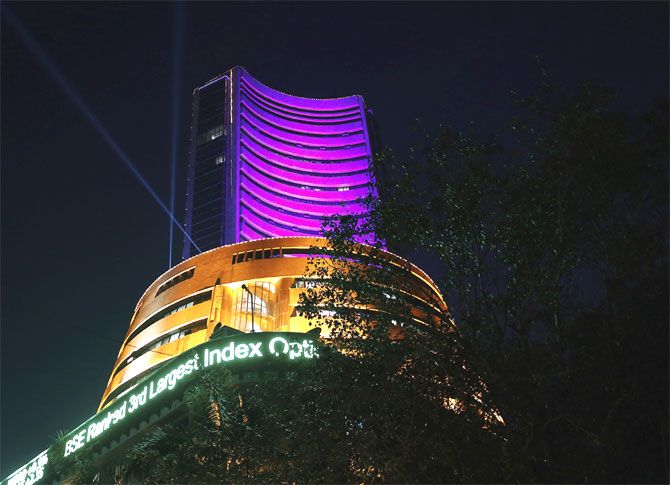The bear market has lasted 10 months and the Nifty is down by over 20 per cent from its all-time peak of 9,119 in March 2015. India's indices fell to new lows in resonance with continued global selling.
India's indices fell to new lows in resonance with continued global selling.
The yuan and the rupee continue to face heavy pressure versus the dollar. Investors sold across every equity and commodity market.
The Nifty is now testing support at 7,300-7,350, after falling over seven per cent in January.
This is a new 20-month low and the Sensex and Nifty are now trading at the same levels that prevailed in late May 2014, when the Bharatiya Janata Party came to power.
The Nifty topped at 7,972 on January 1, a peak that was still well below the index's 200-Day Simple Moving Average (around 8,140 at present).
The latest low is 7,336, which was hit on January 18. There is some support at every 50 points or so, and there is strong support around 7,200-7,250.
The bear market has lasted 10 months and the Nifty is down by over 20 per cent from its all-time peak of 9,119 in March 2015.
Globally, crude oil has seen a rout along with associated energy commodities. Metals have also crashed due to China's woes.
The threat of deflation looms over Europe and Japan. Growth projections are being pared.
Foreign institutional investors have been sellers of rupee equity in January and of rupee equity and debt through November and December.
Retail investors have started selling in the last five sessions. Domestic institutions are net positive.
Breadth is very poor. Volumes have risen noticeably as the market has fallen, which is usually a danger signal.
Bargain hunting and short-covering could provide a recovery mechanism.
A bounce till the 7,700-7,750 levels could come quickly since the index has trended straight down through the 7,350-7,750 zone.
Positive surprises in Q3 results could help turn things around. Perhaps, there will also be some positive traction about the Budget.
A short-term bounce is on the cards The Nifty Bank index is also bearish. It hit new 52-week lows when it dipped below 15,000.
The PSU banks face waves of selling pressure; so does Axis Bank. Other private banks are also being infected. As always, the Nifty Bank sector remains high-beta.
A prior recommendation of a Nifty Bank bearspread of long 16,000p (990) and short 15,000p (262) has been almost fully realised.
The trader could consider taking a narrower spread of long 15,000p (262) and short 14,500p (105).
This costs 157 and it could pay a maximum of 343. This is on the money and it could be fully realised if there are two substantial downtrending sessions.
The Nifty's put-call ratios remain bearish, hovering at 0.83. The call chain for January has ample open interest (OI) between 7,500c and 8,200c.
The January put chain has big OI peaks at 7,500p (well in the money), 7,300p and 7,200p. There is excellent OI till 7,000p.
Given the volatility, option premiums are still relatively low despite being only seven sessions left till expiry.
The trader could consider positions one step off the money, given the volatility. The Nifty closed at 7,351 on Monday with the futures premium at about 20.
A bullspread of long 7,500c (38), short 7,600c (17) would cost 21 and pay a maximum of 89, this is about 150 points from spot.
A bearspread of long 7,200p (39), short 7,100c (23) costs 16, with maximum payoff of 84 and this is also 150 points from spot. The spreads could be combined for a zero-delta long-short strangle set. The cost would be 37, with a max payoff of 63 and breakevens at 7,163, 7,537.
Most traders will continue to favour the short side. The trend is undoubtedly down.
But, a short-term bounce is on the cards, with the likelihood of some short-covering before expiry.











 © 2025
© 2025